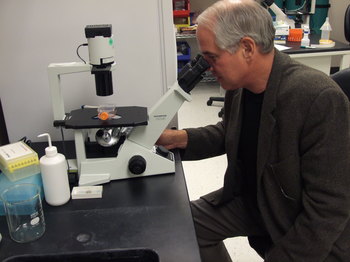Roger Newton: Commercializing cholesterol treatment will depend on partnerships
Roger Newton knows he can’t afford to hire 90 employees this time around.
But he has no plans to let the new funding realities in the biotech world stop him from commercializing technology to improve so-called “good” HDL cholesterol activity in patients at risk of getting cardiovascular and metabolic diseases.
“This time I’d like to bring HDL therapy over the goal line,” Newton said.

Esperion Therapeutics CEO Roger Newton hopes to commercialize new technology to treat HDL cholesterol performance.
Nathan Bomey | AnnArbor.com
He’ll have to do it with less money and fewer employees than he had when his company, Esperion Therapeutics, was flying high several years ago. Newton in spring 2008 restarted Esperion, which Pfizer shut down in 2007 only three years after spending $1.3 billion to acquire the company.
Esperion licensed technology from Pfizer to resume his quest to commercialize therapies to raise HDL cholesterol levels or improve its performance. HDL cholesterol plays an important role in eliminating harmful lipids that can cause various diseases.
Newton knows a thing or two about cholesterol. As a scientist for Warner-Lambert Co. in Ann Arbor two decades ago, he famously co-discovered Lipitor, which lowers “bad” LDL cholesterol and today is the world's top selling drug.
But raising HDL cholesterol in patients is a major challenge that has eluded the industry’s biggest players.
To beat the odds, Esperion must spend capital wisely. For example, Newton is well aware that Esperion won’t be able to afford a 90-person staff like it had at one point before its 2004 acquisition by Pfizer.
The company currently employs 13 workers at the Michigan Life Science and Innovation Center, a business incubator in Plymouth Township.
Funding is too sparse in the capital-intensive drug discovery industry to support a staff of 90 for a small drug company. Newton secured $22.75 million in venture capital to launch his company in spring 2008, but he’s got to make it last since most investors are maintaining a conservative approach in the post-financial crisis environment. Filing an initial public offering - another funding mechanism - is altogether unrealistic.
That’s why Newton believes it’s important for Esperion to rely heavily on research partnerships and consultants to advance the company’s technology.
Esperion announced June 14 that it had established a research arrangement with scientists at the Cleveland Clinic.
Newton said deals like the arrangement with Cleveland Clinic are critical to improving the prospects of Esperion’s clinical drug development efforts. They’re cost effective and they reduce the amount of risk Esperion has to assume.
“We’re going to take advantage of the connections we’ve made, the relationships we already have, and the capability of bringing a multi-talented group together,” he said.
Even if that group is smaller.
Contact AnnArbor.com's Nathan Bomey at (734) 623-2587 or nathanbomey@annarbor.com. You can also follow him on Twitter or subscribe to AnnArbor.com's newsletters.


Comments
Rork Kuick
Mon, Jun 21, 2010 : 1:03 p.m.
Interesting comment, trespass. In danger of being more interesting than the article.
trespass
Sun, Jun 20, 2010 : 5:53 a.m.
Partnerships like this, where the Cleveland Clinic shares the financial risk, deserve a great deal of scrutiny. There are often financial conflicts of interest for physicians involved in clinical drug trials but they have occaisionally and famously resulted in scandals. When there is financial risk for the physicians or their employer the conflicts of interest are harder to manage. The financial arrangements are not made available by the parties, which would make it difficult for a patient to give fully informed consent. Is my doctor putting me in this trial for my benefit or am I being exploited? How could a patient really tell? When a peer reviewer looks at the journal article reporting the results, how is he or she to evaluate the incentive to falsify or hype the result? Transparency of the financial arrangements are important and should be part of the evaluation of the protocol by the Cleveland Clinic's Institutional Review Board (IRB) but it is hard for an IRB to be independent when their employer has a financial risk in their approving the protocol. It is hard to imagine the perfect oversight process in such circumstances but it seems that it should at least involve public disclosure of the financial arrangements and review by an IRB not affiliated with the Cleveland Clinic.